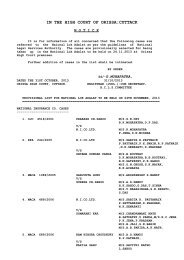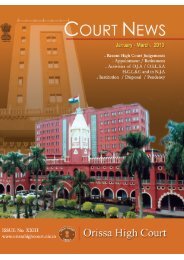ORIGINAL JURISDICTION - Orissa High Court
ORIGINAL JURISDICTION - Orissa High Court
ORIGINAL JURISDICTION - Orissa High Court
You also want an ePaper? Increase the reach of your titles
YUMPU automatically turns print PDFs into web optimized ePapers that Google loves.
162<br />
“354. Assault or criminal force to woman with intent to<br />
outrage her modesty – Whoever assaults or uses criminal force to<br />
any woman, intending to outrage or knowing it to be likely that he will<br />
thereby outrage her modesty, shall be punished with imprisonment of<br />
either description for a term which may extend to two years, or with<br />
find, or with both.”<br />
The word, ‘modesty’ has not been defined in the Indian Penal Code. Hon’ble<br />
Apex <strong>Court</strong> in the case of Rupan Deol Bajaj (Mrs.) and another V.<br />
Kanwar Pal Singh Gill and another, 1995 S.C.C. (Crl.) 1059 has relied<br />
upon the dictionary meaning of the word ‘modesty’. The Apex <strong>Court</strong> further<br />
relied upon the case of State of Punjab V. Major Singh, AIR 1967 SC 63,<br />
wherein the apex <strong>Court</strong> has held that when any act done, in the presence of<br />
a woman, is clearly suggestive of sex according to the common notions of<br />
mankind, it must fall within the mischief of section 354, I.P.C. The Apex<br />
<strong>Court</strong> further held that it was needless to say, the “common notions of<br />
mankind” referred to by the learned Judge have to be gauged by<br />
contemporary societal standards. It was observed that the essence of a<br />
woman’s modesty is her sex and from her very birth she possesses the<br />
modesty which is the attribute to her sex. Thus, relying on earlier case, the<br />
Apex <strong>Court</strong> in Rupan Deol Bajaj’s (supra) case held that the ultimate test<br />
for ascertaining whether modesty has been outraged is the action of the<br />
offender such as could be perceived as one which is capable of shocking the<br />
sense of decency of a woman. Applying the above test to the reported case,<br />
KELU CHARAN BEHERA -V- STATE [S.K.MISHRA,J.]<br />
the Apex <strong>Court</strong> held that it must be held that the alleged act of the<br />
respondent in slapping the complainant on her posterior amounted to<br />
“outraging of her modesty” for it was not only an affront to the normal sense<br />
of feminine decency but also an affront to the dignity of the lady – “sexual<br />
overtones” or not, notwithstanding.<br />
7. Applying the aforesaid principle of appreciation to this case, it is<br />
seen that the informant does not complain that the present petitioner aimed<br />
the blow to her breast. Rather, she has very categorically stated that the<br />
petitioner pressed the Lathi (Katha) on her neck and stood on it. Then the<br />
petitioner’s wife dragged him. The injury was caused to her breast for the<br />
action of the accused persons. It thus, appears that the injury to her breast<br />
was caused accidentally. The injury, which was sustained by the injured on<br />
her breast has not been attributed particularly to the present petitioner in the<br />
sense that she has not stated that due to his assault she sustained the<br />
injury. Rather she has stated that due to the assault of the accused persons,<br />
she sustained the injury. In this case, this <strong>Court</strong> comes to the conclusion that<br />
applying to the standard laid down by the Apex <strong>Court</strong> in Rupan Deol Bajaj’s<br />
case (supra), it can not be held to be an affront to the normal sense of<br />
feminine decency. It is further noted that in this case there is no suggestive

















